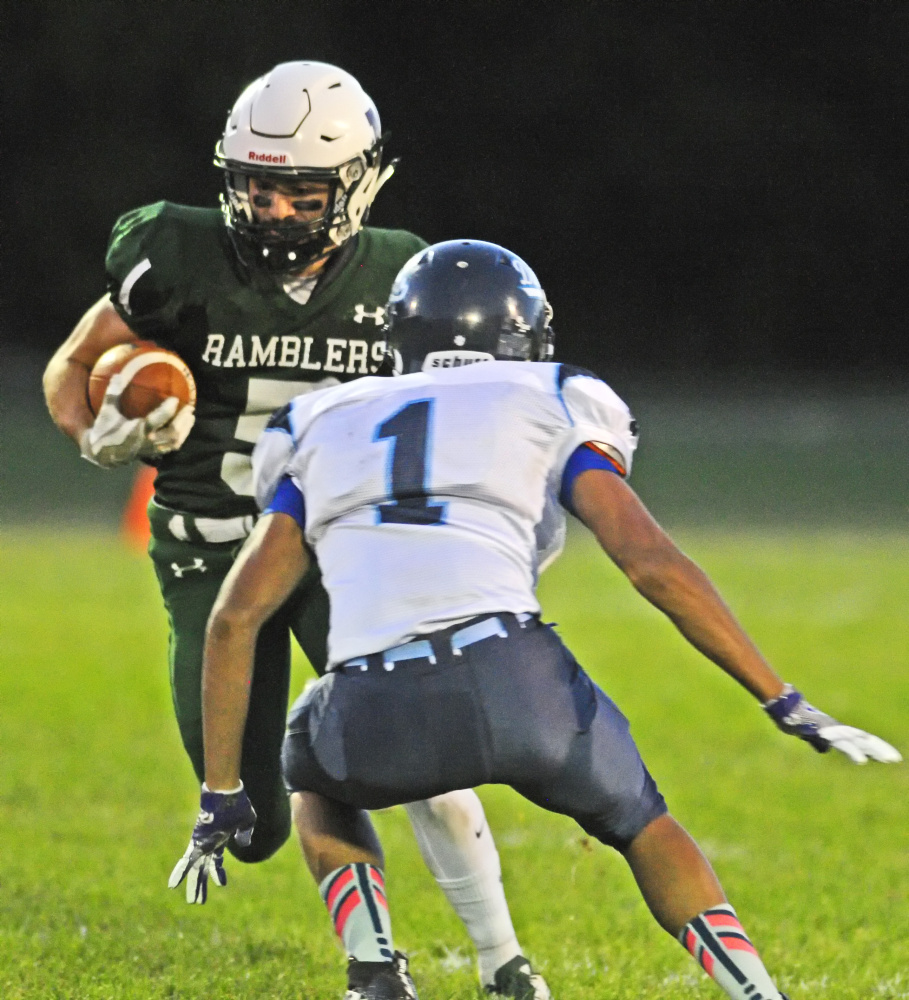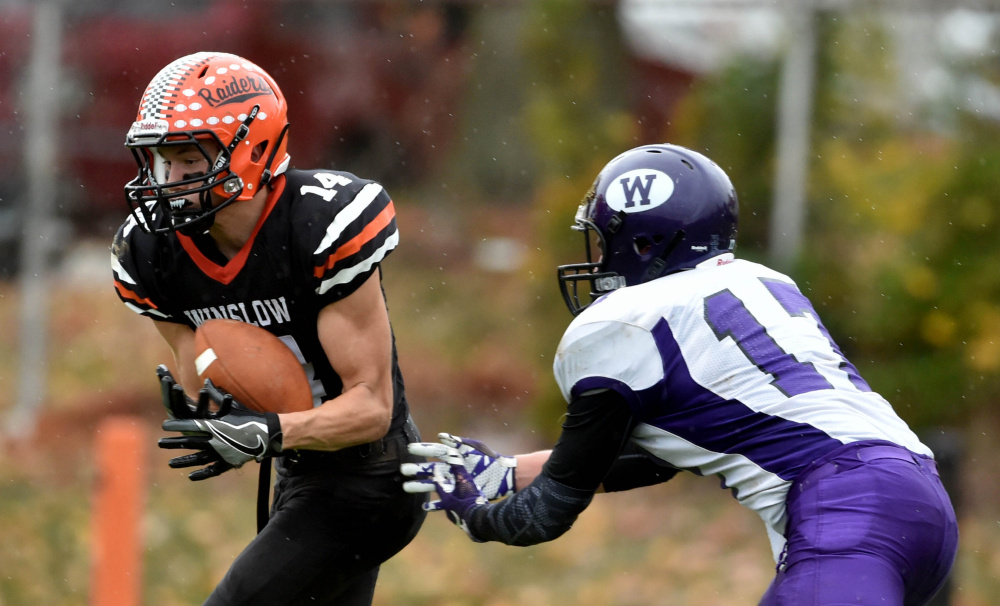It was Oct. 30, 2015, and Skowhegan football coach Matt Friedman did not feel right. It was a fall Friday, and the Indians didn’t have a game. It wasn’t because his team’s season was over — they were instead getting ready to host a playoff game the following week.
It was the bye. By virtue of its 7-1 record in the Pine Tree Conference Class B regular season, Skowhegan earned the No. 2 seed and a week off. A week after the bye, Skowhegan lost a tight game to Brewer, 16-15, and the season was over.
“We were very excited last year to finish No. 2,” Friedman said. “I really feel like we came out and lost a lot of momentum by not playing that week. That Friday we didn’t have a game seemed odd… We had two good weeks of practice. Take nothing away from Brewer, they were a great team. We definitely felt rusty when we took the field versus Brewer.”
Five of the state’s eight football conferences have playoff byes for the top two seeds this season. That gives 10 teams this week to rest up and get healthy — or get cold and rusty.
Two-time defending Class C state champion Winslow had a bye week in each of the last three seasons. This year, the 7-1 Black Raiders enter the Big Ten Conference playoffs as the three seed and will host Old Town in a quarterfinal game Saturday. Longtime coach Mike Siviski prefers playing, even if it means his team is on the road for the remainder of the postseason.
“I don’t like not playing. I don’t like byes. I think that was absolutely crazy that our conference last year had two coin flips,” Siviski said.
Siviski referred to the coin toss his team had with Old Town to determine the top seed in the 2015 playoffs. The Big Ten also had a coin toss to determine fifth and sixth place between Foxcroft Academy and Oceanside. The coin flips were the result of the Big Ten teams playing an eight game schedule, instead of a nine-game full round robin. The loss of that game narrowed the number of tie breakers, so when teams that didn’t play each other ended up with identical records, playoff seeding came down to the luck of a coin toss.
“We had the opportunity to play every single team in the conference, and instead of having six (playoff teams) and two byes, have four. Teams 10, nine, eight, seven, six and five would all get an extra game. Everybody wanted to have playoffs with six teams and two byes, so that’s what we did,” Siviski said.
With a 7-1 record, Madison earned one of the Big Ten Conference byes this season, along with Mt. Desert Island. Madison coach Scott Franzose said he’d prefer a nine-game regular season with the top four teams making the playoffs, but he understands that playoff incentive for more teams is important.
“I’m old school. I’m a firm believer that the playoffs should be the best of the best,” Franzose said.
That said, Franzose admits making the playoffs in 2014 as the five seed in Class C North was an important building block for his program. It was Madison’s first playoff game in a generation, and while the Bulldogs lost 20-12 at Belfast, it showed the team what it takes to advance. Last season, Madison earned the four seed, and now the Bulldogs have a bye as the two seed in the conference.
“I see both perspectives to the argument,” Franzose said.
Cony coach B.L. Lippert says the bye week benefits outweigh the negatives.
“I know it can be a challenge to sit idle for two almost weeks, but having the bye has tremendous advantages. For one, it means you’ve got an outstanding team, but beyond that, from a football standpoint, you get to sit at home and rest while your future opponent has to play a physical game and risk getting nicked up,” Lippert said. “I’ll take those benefits all day over the potential for getting a little out of rhythm offensively.”
Lippert was Cony’s offensive coordinator in 2013 and 2014, when the Rams earned byes each season. In 2013, Cony returned from the week off to beat Messalonskee and went on to win the Class B state title. In 2014, the Rams were upset by a Lawrence team that had played the previous week, 28-27. Lippert stressed the loss wasn’t the result of any rust Cony may have had from a weekend without a game.
“No, Dustin Simpson-Bragg and Seth Powers hurt us, not any extended time off,” Lippert said, referencing Lawrence’s two outstanding receivers who each had big games in that win at Cony. “We had two weeks to scheme for those guys and couldn’t have been more prepared. It wasn’t rust that cost us, it was a couple of big time athletes making ridiculous catches that did.”
The Campbell Conference Class D (Class D South) almost had no choice but to implement a bye week for the top two seeds this season. When Boothbay decided to drop its varsity football program in favor of a junior varsity season early in the season, the league —which was down to eight teams — was left scrambling to rebuild its schedule. Medomak Valley, a new program playing down a class, was ineligible for the playoffs. The Campbell Conference decided a seven-game schedule — with each team getting a regular season bye week, followed by a six-team playoff — was the best option.
“The other option would have been to play one more week and play one team twice,” Winthrop/Monmouth coach Dave St. Hilaire said.
Winthrop/Monmouth had the misfortune of its scheduled regular season bye coming in Week 8, giving the Ramblers two consecutive weekends without a game.
“Early on, we saw what would happen if we kept winning,” St. Hilaire said.
When St. Hilaire saw Maranacook was struggling with low numbers on the roster, he was concerned the Ramblers’ Oct. 14 game against Maranacook wouldn’t get played, giving his team three weeks between games. Maranacook was able to play out the season, however, and while the game against the Black Bears wasn’t competitive (a 54-6 Ramblers win), it was at least played. Winthrop/Monmouth scheduled a controlled scrimmage against Madison for Wednesday, just to get a chance to compete against an opponent. Until the Ramblers play Nov. 4 when they host a regional semifinal, they’ll have to make due with intrasquad work at practice.
“There’s a lot of competition at practice. We’re just trying to compete as much as possible to keep the kids hungry,” St. Hilaire said.
After having the playoff bye for the top two seeds in each of the last three seasons, this season the Little Ten Conference (Class D North) chose to eliminate the bye. That meant adding a ninth game to the regular season and cutting playoff participation from six teams to four. That means a team with a winning record will not make the playoffs. That’s not necessarily a bad thing if it increases competition in the regular season.
“There was a lot of discussion on, do we go to four or eight teams in the playoffs? We just felt it’s really nice to have that (ninth) game,” Maine Central Institute coach Tom Bertrand said. “Our league wants to send the best possible team to the state championship game. In the end, we’ll have four teams that are deserving.”
Bertrand’s Huskies had a bye in each of the last three seasons, going 2-1 in games coming off a week off. Bertrand said initially, he was in favor of the bye week but after seeing it in practice, he changed his mind.
“We would have rather played,” Bertrand said. “The consensus was those teams that had those bye weeks would have rather played. It’s about rhythm and routine.”
Travis Lazarczyk — 861-9242
tlazarczyk@centralmaine.com
Twitter: @TLazarczykMTM
Copy the Story LinkSend questions/comments to the editors.





Success. Please wait for the page to reload. If the page does not reload within 5 seconds, please refresh the page.
Enter your email and password to access comments.
Hi, to comment on stories you must . This profile is in addition to your subscription and website login.
Already have a commenting profile? .
Invalid username/password.
Please check your email to confirm and complete your registration.
Only subscribers are eligible to post comments. Please subscribe or login first for digital access. Here’s why.
Use the form below to reset your password. When you've submitted your account email, we will send an email with a reset code.